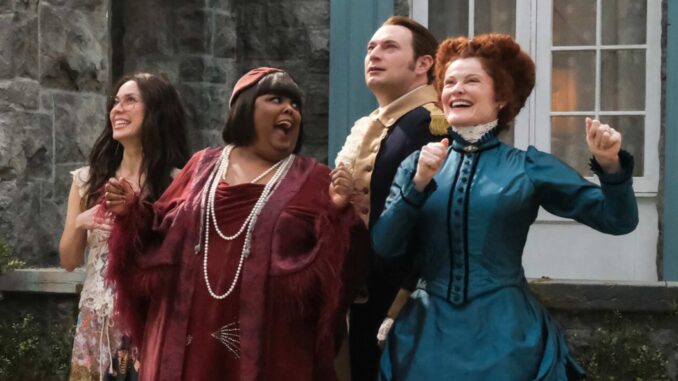
The sprawling, labyrinthine manor of Button House has always hummed with the echoes of lives past, a spectral tapestry woven with the foibles and fascinations of centuries gone by. For Alison and Mike, its living inhabitants, and for the motley crew of ghosts who call it home, life in this peculiar purgatory has settled into a comfortable, if chaotic, rhythm. They’ve navigated spectral power surges, accidental ‘suck-offs’ to the next realm, and even the occasional emotional breakthrough. But what happens when the very fabric of their spectral serenity is unexpectedly rent by a return so utterly improbable, so delightfully preposterous, that it turns Button House upside down?
Season 5, rumour had it, was set to deliver an unfathomable curveball, a spirit so surprising, it redefined the boundaries of spectral existence. And it did, not with a grand entrance, but with a barely perceptible sigh emanating from the darkest, dustiest corner of the attic: the disembodied head of Humphrey Bone.
Humphrey, for those who recall, was the unfortunate Georgian nobleman whose body was, for centuries, the resident headless ghost of Button House. His head, however, was long believed to have met a grisly end elsewhere, perhaps adorning a pike, or lost to time. Yet, in a stroke of genius that could only belong to the writers of Ghosts, it was revealed that Humphrey's head – a perpetually bewildered, slightly mouldering gentleman's head, perched precariously on a dusty mantelpiece – had always been there. It simply hadn't manifested as a speaking, sentient spirit until Alison, during a particularly vigorous spring clean, knocked a specific, heavily enchanted-looking dust-ball from the mantel.
The initial shock was palpable. Alison, of course, nearly fainted, convinced she’d finally lost her mind. The ghosts, however, were a different matter. Fanny, ever the picture of Victorian propriety, shrieked, "Humphrey! You… you insufferable, pompous buffoon! I thought I was rid of you!" It was a reunion less of love and more of long-simmering marital resentment, reignited with the force of a thousand dusty thunderstorms.
The comedic goldmine that followed was immediate and explosive. Humphrey's head, surprisingly articulate and even more surprisingly opinionated, was a direct, constant counterpoint to Fanny. Where she was prim, he was pedantic. Where she was scandalized, he was utterly unrepentant. He remembered every slight, every poorly cooked meal, every condescending glance from his wife, and was not shy about voicing them from his stationary perch.
Julian, ever the opportunist, immediately began a betting pool on how long it would take Fanny to physically try to dislodge him. Pat, in his earnest way, attempted marital counseling between a living woman, a headless body, and a disembodied head. Thomas, naturally, found a tragic, unrequited love story in Humphrey’s lonely vigil. Even Robin, with his ancient wisdom, seemed amused, occasionally rolling the head a few inches with his spectral energy, much to Fanny’s outrage.
But beyond the slapstick and the verbal jousting, Humphrey’s surprising return brought a profound depth to the show. His presence forced Fanny to confront the ghost of her own past, literally. For centuries, she had spun a narrative of her marriage, painting herself as the long-suffering wife of an idiot. Humphrey’s head, however, offered an alternative perspective: his perceived idiocy was often a reaction to her own rigidity, his pompousness a shield against her judgment.
Their arguments, initially a source of entertainment for the other ghosts, slowly began to peel back layers of unresolved grief and misunderstanding. They talked, they shouted, they remembered – not just the bad, but the fleeting moments of genuine connection, the shared laughter, the quiet companionship that had existed beneath the social strictures of their era. It was a poignant reminder that even in death, relationships continue to evolve, and forgiveness, even of oneself, is always possible.
The surprising spirit of Humphrey’s head wasn’t just a clever plot device; it was a catalyst. It forced the Button House family, both living and dead, to re-examine their own stories, their own prejudices, and the complex, often messy, nature of human connection. It showed that even a disembodied head, long thought lost, could hold the key to unlocking centuries of unresolved emotion, proving once again that in the peculiar, heartwarming world of Ghosts, eternity is never truly static, and every new arrival, no matter how outlandish, brings with it the promise of growth, laughter, and perhaps, a touch of unexpected peace.